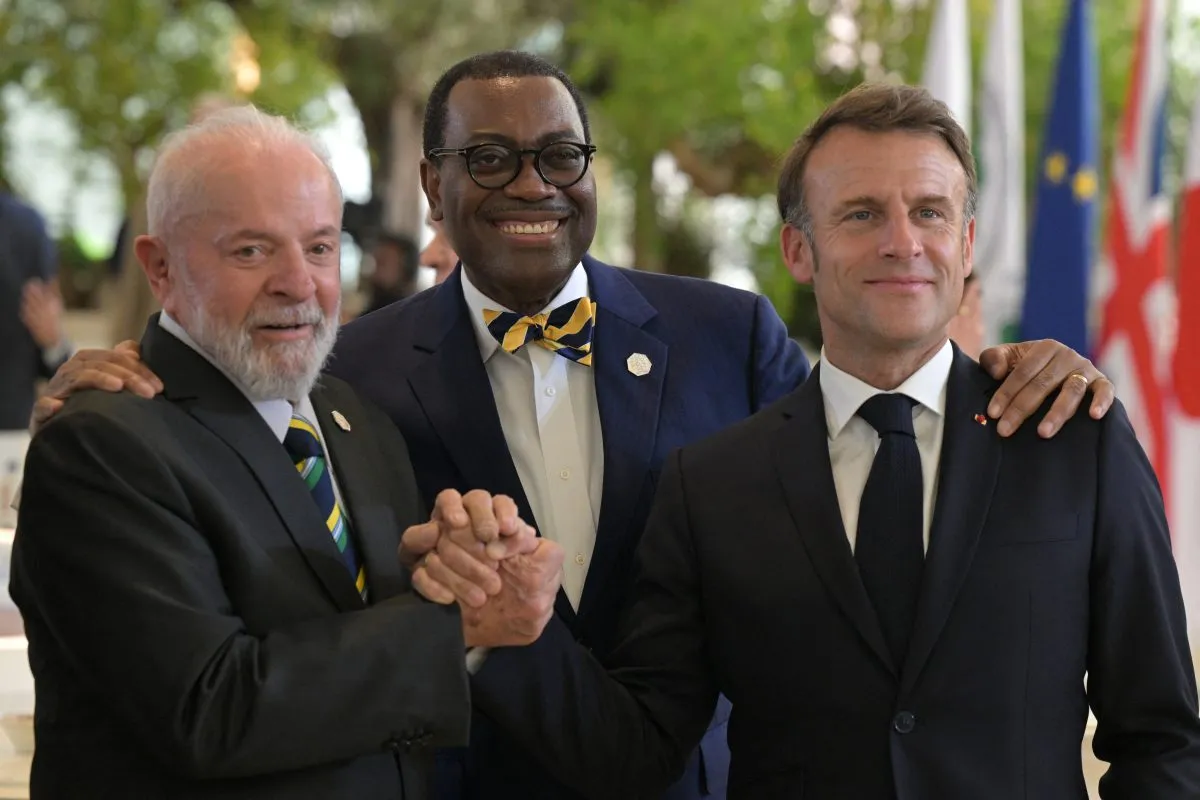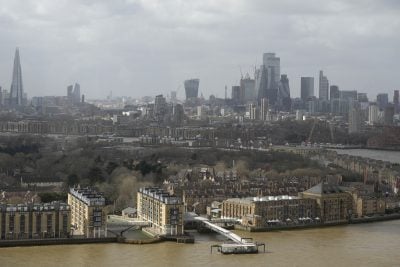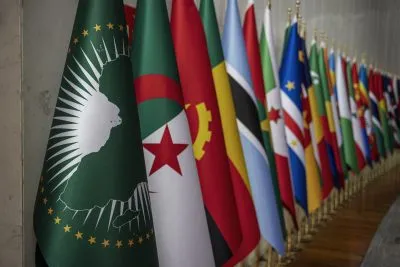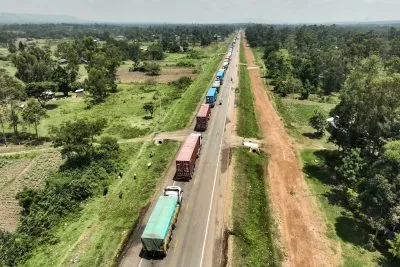He’s had his critics over the last eight years, but you could never really fault Akinwumi Adesina for a lack of passion and resilience. The newspapers have called him Africa’s optimist-in-chief; surely, the Nigerian would have been a poor president of the AfDB if he were a pessimist.
This is Adesina’s valedictory year and he will be circling the globe talking to investors and world leaders with his brand of pragmatism blended with irrepressible optimism.
Within a week of this fleeting trip to London he was at the G7 Leaders’ Summit, shaking hands with world leaders including US President Joe Biden, India’s Prime Minister Narendra Modi and the Pope.
I have been interviewing him for more than a decade, ever since he served as minister of agriculture in Nigeria, and he has lost none of his irrepressible energy.
“It is not a job, it is a mission. I have been given the trust and the resources and the platform to develop the continent of my birth and I will breathe that mission until the very last minute of my assignment. You will probably have to remind me that they have elected a new president before I stop working!”
Before more than a hundred invited guests at the Chatham House think tank, in St James’s Square in the heart of London, Adesina is up on the podium giving it everything on behalf of a mineral-rich continent that is still poor.
Numbers, statistics and stories tumble forth at breakneck speed; Adesina is a flamboyant storyteller, who speaks urgently and gestures with his hands to make the point.
His mannerisms are the fruit of a remarkable life: born among the Nigerian poor, forged in a top university in the United States and seasoned by numerous missions in the corridors of power.
That can-do Ivy League approach to life came to the fore very recently, according to one of his aides.
Adesina would have to make a journey on a boat for work: a safety officer asked him if he could swim.
“No,” was the answer.
But Adesina didn’t need asking twice; he donned a bathing suit and learned the crawl and breaststroke, at the age of 64, before completing his (incident-free) journey.
Africa’s challenges multiply
We repair to the 135-year-old Savoy Hotel, in the Strand, for the interview. It was the first hotel in Britain to adopt electric light bulbs; Adesina is very mindful of the fact that more than a century later millions of Africans have yet to flick their first switch.
His suite overlooks Waterloo Bridge, which spans the grey River Thames. Three kilometers downstream is London Bridge, where every morning hundreds of financiers, who handle the very capital that Adesina wants to channel to Africa, walk across the river to their offices in the City of London.
For Adesina, forever on the hunt for new sources of capital that the continent can tap, the challenges facing Africa are as urgent as ever.
When I attended Adesina’s first speech as African Development Bank president in Johannesburg, he told me he wanted “a new Africa that people want to come to, and not move out of”.
Eight years on, the large-scale migration of Africans to Europe and elsewhere continues, and remains a huge political and economic issue on both sides of the Mediterranean.
The number of irregular border crossings at the EU’s external border in 2023 reached a total of approximately 380,000, driven by a rise in arrivals via the Mediterranean region, according to preliminary calculations by Frontex. This marks the highest level since 2016 and constitutes a 17% increase from the figures in 2022, indicating a consistent upward trend over the past three years.
As the exodus continues, does Adesina’s vision still hold true?
“I think first of all I am not against legal migration. Legal migration should continue to go ahead because that is a labour market where people can move their skills and that’s ok,” he says.
“It is the forced illegal migration that I think is a big challenge. People forget that 85% of the migration of young people in Africa is internal; people moving from one country to another. But [external migration] does get exaggerated because of the media [coverage] when people sink on the Mediterranean. But Africa’s heartland is not emptying into it [Europe] – that is what I am saying.”
He acknowledges that a complex range of factors continue to push both internal and external African migration.
“We need to also understand that a number of factors have been pushing that. Climate change has made it much more difficult too. A lot of internal conflicts are because of poverty, inequality or pressure over resources and politically motivated conflicts that we have had.”
But there are perils in remaining at home, too. Adesina warns that if large numbers of Africans are unemployed in unproductive countries, terrorists will find it easy to recruit them, as has happened in Mozambique.
With so many challenges facing the continent, does he despair sometimes?
“I don’t despair. I just look at challenges we need to fix. For example, consider the growth process that we talk about quite a lot. Yes, I am happy with the growth figure that we have: it is not the level that we wanted, but we still have 10 of the 20 fastest-growing economies in the world.”
It’s a long way to the top
Adesina’s familiarity with the impossible choices faced by the poor is etched into his DNA. He is the son of a former farm worker from Ibadan, 128 km north east of Lagos, for whom toil in the soil was bred-in-the-bone. His life is a remarkable African tale of ambition, inspiration, grit and application. Adesina grew up sleeping on a mat, alongside his brothers, without running water or proper toilets.
“Ï grew up very poor. My grandfather and father used to work on other people’s farms for a penny a day,” Adesina told me in Johannesburg, in 2019.
One word drove the life of Adesina senior: education. Every night he would take out a blackboard in the tiny family home and teach his young sons English and arithmetic.
“One day, he told us that the difference between his life and that of the permanent secretary at work was like the difference between light and darkness. But he said to us that if we worked for an education, we and the children of the permanent secretary would be at the same level,” says Adesina.
His father saved almost every penny he earned to put his sons through school. Yet he didn’t send his sons to a private school. Instead, they went to a village school with 60 in a class.
“He wanted us to understand rural poverty. It allowed me to form an idea of what to do with my life. It taught me that poverty is real, and I grew out of it myself,” says Adesina.
The village school also taught the young Adesina the power of agriculture over the lives of poor people. He saw that when the crops grew there was always money to keep the children at school; if the crops failed, the children were taken out of school to work.
He sailed through school with flying colours and passed enough exams to enter university by the time he was 14 – success that prompted some tension with his father, who had dreamed of a medical career for Akinwumi.
“My father threw a fit because he thought that agriculture was where he had come from. He wasn’t happy. In the end, my father said to me: Akin, God must really want you in agriculture,” recalls Adesina.
Adesina studied for a bachelor’s degree in agricultural economics at the University of Ife in Nigeria in 1981. He followed it up with a PhD in the same subject, in 1988, from Purdue University, Indiana, one of the best agricultural schools in the United States.
He leveraged his agricultural expertise in his role as a senior economist at the West African Rice Development Association; as a senior scientist at Rockefeller Foundation; and, most significantly, as Nigeria’s agriculture minister from 2010 to 2015. It was his success in this role – and the contacts he reaped – that allowed him to launch his bid for president of the African Development Bank.
A lending machine
So what has been the significance of his two-term presidency at Africa’s premier multilateral institution, and to what extent has he made headway with solving the continent’s most pressing challenges?
First and foremost, Adesina says, in his eight years at the helm he has increased the pool of capital available to the AfDB to invest in the continent.
When he took over, he first increased the pool to $201bn by 2019: it stands at $318bn today, he says.
He points out projects where some of those billions have already been deployed. He says $50bn has been poured into infrastructure in the last eight years, and billions into agriculture.
He reels off what he considers the bank’s major achievements. “Ethiopia is self-sufficient in wheat in less than in four years. We are setting up $1.7bn agricultural processing zones and infrastructure that will allow value chains to emerge,” he says.
“In Benin, they used to export cotton fibre. Since we set up agri-processing zones two years ago 100% of their fibre is processed into textile garments. All their cash used to go to Vietnam!”
Recently he spoke to a group of investors who wanted to export bauxite from Africa.
“I told them why don’t you go for aluminium and not just bauxite, otherwise the profits will be made in another country and you will end up poor!’”
Yet Adesina admits capital investment is not reaching the poor people who live in rural areas. An estimated 700m people in sub-Saharan Africa live in rural areas – around 57% of the population – more than three times the population of Nigeria.
“A lot of that [capital] that goes into Africa for infrastructure goes into urban areas; the bulk of the population is in rural areas. So, if you are going to really get a lot of people out [of poverty], you have to turn those rural economies, because, literally I can tell you, those rural economies are nothing more than zones of economic misery.”
Africa’s unfair risk premium
But even as his term draws to a close, Adesina is still making sure Africa’s concerns are high up on the global agenda.
In recent months, he has argued repeatedly that the cost of capital is too high in Africa – driven by an outdated “risk premium” placed on the continent by outside investors and credit ratings agencies. In particular, Africa is constrained by a dearth of longer term, cheaper, so-called concessional capital, he claims.
“Concessional financing has plummeted in Africa. It used to be that the debt exposure of African countries was about 52% concessional financing in 2010; today it is 25%. As that has gone down many countries are going to the capital markets, they are going to private lenders and commercial lenders…When you have a lot of commercial creditors, it is different, you need to walk smarter.
“What I am asking for is transparency, it is accountability… we want economies to grow in a way that is sustainable without accumulating nonsensical debt,” says Adesina.
What grieves Adesina is that when African nations do go to the commercial lenders they risk paying through the nose. Africa’s debt service payments will be $74bn this year, up from $17bn in 2010, according to the AfDB.
“The cost of raising capital in Africa is three or four times what it is in other regions. Why? Because of the so-called Africa premium. A country in Latin America – a BB country in terms of credit ratings – raises money [at the same time as] a country in Africa. The one in Africa pays 1.1 percentage points more in interest… The issue is perception, the perception is not reality – data matters,” he says.
“Something happens in one part of Africa and they say the whole of Africa is a problem. You have a situation where a coup happened in Niger and President Ruto of Kenya was telling me as a result of that he had to pay 220 basis points higher for his bond issue; even though Niger is nowhere near Kenya!”
Adesina wants one of the legacies of his tenure to be Africa’s own ratings agency, run from the continent instead of New York and London. The shareholder countries of the AfDB have mandated the bank to look into ways of doing it.
“It is not to compete with any ratings agencies… but to be able to get proper assessment of risks, to be able to compare methodologies, and to be able to give a fair assessment. Some people think it is going to be political. It is absolutely not. That is crap,” he says.
“It is just to make sure that Africa’s risks are properly understood and better priced.”
It is going to be a tall order for Adesina’s technocrats to come up with a workable plan to achieve this in his final year. If he does, it could be one of the major landmarks in his tenure running the AfDB.
At the same time, Adesina also wants to raise funding from Africa’s own capital markets.
“It is not just foreign-currency-denominated financing that matters; we also need to employ domestic capital markets and employ a lot more local currency financing, which we are doing. We are doing local currency bond issues in Tanzanian shillings, Ugandan shillings, Nigerian naira, Ghanaian cedis and all of that,” he says.
Adesina says that governments still have a vital role to play in supporting the bank’s work.
“Framing the issue by saying the government should get out of it and let the private sector do it, is misdirected. The government cannot abdicate their responsibility. In all developed countries, whether you are talking about energy, or even aviation, medicines, infrastructure, or security, it is all about government,” he counters.
“Government has to set the right policies, the right investment environment, the government also has to inject money to create public goods. The private sector is not going to set up public goods so let’s not get ourselves confused.”
End of an era
Now, as Adesina’s time as president of the AfDB draws to a close, the jockeying to be his successor has already begun. Observers say the new president needs to be strong, decisive and visionary.
Whoever wins next year’s election faces an enormous in-tray. With many African countries still struggling under mounting debt, depreciating currencies, high inflation, and sluggish global growth, the role of the AfDB in contributing to sustainable economic development is even more important.
The current president has been lobbying hard to have the Special Drawing Rights of the IMF channelled to the AfDB to increase the continent’s fire power to accelerate development.
The onus will be on the new incumbent to press ahead with this, to win the argument on concessional financing, and to get the funding to where it is needed the most. Adesina has laid the groundwork but it is now time for others to pick up the baton.
As he looks for his next challenge, I ask Adesina whether he has any regrets.
“No. I always say: when God created people he gave them two eyes in front because he expected them to be looking forward. If he wanted them to be looking behind, he would have put two eyes behind the head.”
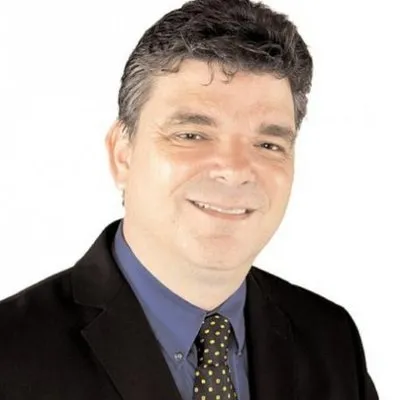
 Sign in with Google
Sign in with Google 